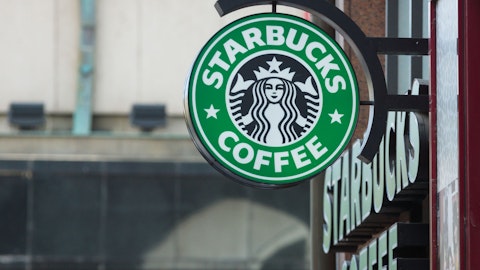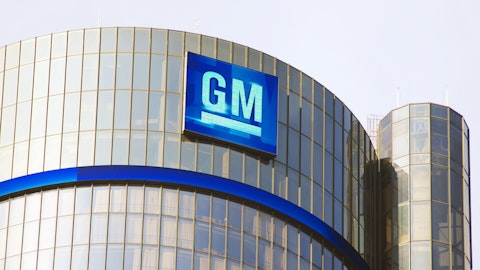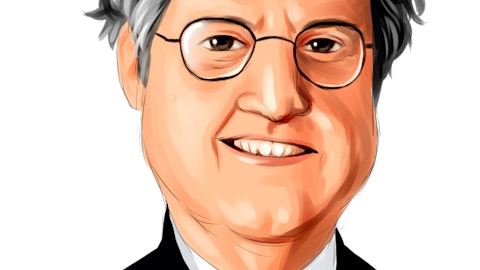Unidentified Participant: This is Chris on for John. Can you double click on the commentary from last quarter around bringing margin expansion throughout the year and maybe just give us a sense for kind of what line items we should expect that to come from? And then help us size you’re anticipating as well?
Julie Whalen: As far as margin expansion, as we move throughout the year, certainly, as we deliver more top line growth, and right now, we’re in sort of more the mode of driving gross bookings where we don’t get the benefit of that to revenue, into earnings until the stay. And so, in the back half, with this outperformance that we’re seeing today, we expect to have that benefit the P&L. And of course, we’re expecting marketing leverage as we move throughout the year based on all the things we talked about that we’re going to benefit from. So it’s really those two lines. We’re going to be obviously working on efficiencies across the company as we deliver on our tech stack and start to be able to repurpose individuals and cut costs and things like that. And that’ll also drive some efficiencies. But it’s really the top line revenue growth and the marketing efficiencies in the back half.
Peter Kern: And I’d just add one thing, which is the shape of the curve this year is we have a lot of work to get done. And that involves a lot of people being dedicated to these big lifts. But as we get towards the end of the year, a lot of that work subsides, so that we can stick with those people and that great talent on growth initiatives that are more near term generative. So that’s part of what happens is every time we put something to bed, we get more resource available to drive conversion growth, to drive improvement in the customer experience that turns into money. So, that’s the efficiency we get going forward once we’re over these big lifts is much bigger. How much of it hits this year versus future years? TBD. But that’s the journey we’re on, is we’ve got to get over these big humps and then we start to – we’ve seen it already when we did the hotels.com conversion, migration.
We freed up a lot of talent to work on near term conversion wins. And it’s been hugely productive for us. Again, every time we do one of these, we get more capability back to put against more near term uplift in the business. And so, that’s where we start to get more separation relative to the cost base. And that’s partially this year, but it’s obviously more going forward.
Operator: Our next question comes from Tom Champion with Piper Sandler.
Tom Champion: Peter, just any interesting observations behaviorally on the GPT plugin. Maybe too early, but just curious, any comments? I think this is self-evident in your implication, but the tech replatforming will be ostensibly complete in the US in July with the launch of One Key. Just curious if that’s the case. Just a final one for Julie. I was a little surprised by the outsized impact of FX on EBITDA in 1Q. Curious if you can elaborate on that or add any details.
Peter Kern: I’ll try the first couple. So you said the ChatGPT plugin. That is where we’ve made a plug in for their environment, so that when people are searching, thinking about travel in their environment and want to see if there are hotels near the Eiffel Tower, what flights leave from LA to New York on Tuesday, if they have our plugin, we can provide that. That is still only available in the paid and the developer environment. So it’s not like out in the wild. So it’s small still, but interesting to see how people behave, people are using it. And obviously, it’s not materially changing our numbers, but definitely a lot of interesting learnings for us. We’ve also deployed it, which meant into our own iOS app. And that’s to allow people to essentially use the capability in our app to do a similar thing.
What hotels are near the Eiffel Tower, or whatever they might be searching for. And what we do then is, if ChatGPT provides answers, and it’s a series of hotels, we will take those hotels, save those hotels for people, so that they can then go shop, comparison shop, look at images, do whatever they want. Again, early days, but people have engaged with it. It’s been interesting to people. Not a huge driver yet. And that’s why I say, we don’t know how big a driver it’s going to be in behavior, but it’s definitely interesting. And I’ll just add, we wouldn’t be the only company in the world, but we are on the forefront of looking at other ways that large language models can help other parts of our experience, whether it’s with our partners, whether it’s turning descriptions into property descriptions, making that easier for people, there’s a lot of ways we think we can look at using AI in this construct, but we use AI and machine learning and a lot of other constructs, as I talk about, whether it’s optimizing pictures or anything else.
So it’s interesting. It’s early. And we’ll see. And we’ll see when the plugin is available to a wider audience, what it drives, and we’ll see what ChatGPT does to the search environment. We’d love to see more competition in global search. So we’re rooting for more competitive search environment. And we think we’re staying on the absolute front of what anyone’s doing in travel with large language models. As far as the tech replatforming goes, yes, the answer to your question is yes. The last of the big things in the US is really to launch One Key. Now a launch is a launch. And sometimes it takes a little time to harden that and make sure everything’s working perfectly. But, yes, essentially, once One Key is done in the US, that’s the last of the sort of big boulder lifts we’ve had.
Now we want to launch One Key in more places. There’s work to do to complete the set, if you will, as we complete the geographical set of capabilities, and so forth. But in terms of the really big lifts, on the biggest piece of our business, that will be the last of the lifts. And that’s why I say I think we have a lot more talent available to drive other things once we’re over that hump.
Julie Whalen: As far as FX, obviously, it just really depends on which currencies we are transacting in and their relativity to the strength of the US dollar. And the difference between the delta on the top and the bottom line is really just a function of – Q1 is our lower earnings quarter. And so, it has a more pronounced impact on the lower level of earnings relative to the top line. It’s obviously a much bigger numbers. So it’s just a function of math.
Operator: The next question comes from Mario Lu with Barclays.
Mario Lu: The first one is a follow up on One Key. Mentioned it’s rolling out in July. Is that a global rollout? Just US? And then is there like a rough timeframe we should think about in terms of when we should see the benefits of the joint loyalty program? I understand that take rates will take a hit initially once points are redeemed, but just curious how we should think about the expected payback period.
Peter Kern: Yes, we’re rolling out in the US first. We will roll out in the rest of the world later in the year and next year. Just keep in mind, there are differences in the rest of the world where, in some cases, not all brands are present. In some cases, we have a different brand in lieu of one of our brands. So, they will take on slightly different flavors across the world. But the US obviously is the biggest proof point and the biggest place in which we think the installed base gets the biggest lift. And as far as that payback goes, obviously, loyalty is a thing which drives future repeat, future loyalty, future engagement. And as you know, we’ve been focused on signing up as many – even before One Key, on getting way more of our customer base signed in, signed up and engaged with our products.
Now least of all because they see the best prices that way. They get rewarded for their travel and they have reasons to come back. So we’ve modelled it a lot of different ways. It’s difficult to say how quickly it pays back, given that travel for most people is a one and a half times a year kind of endeavor on average. Now, obviously, there are people who go 20 times a year, like everybody on this call probably. So we will see. We’ve modelled it a series of ways. But we don’t expect a huge payback in this year. We think some of it will come back this year, and some of it will come back in the future. And it will keep building on itself. And as we’ve said before, our intent is between all of the levers we have of spend via direct sales and marketing, paid search, discounting, loyalty and everything else, we view that as one pool of capital, and we intend to balance between those pools.
So as we provide more loyalty, which will drive again some longer term payback than the short term paid search stuff, we will pull it out of other spots to accommodate that and live within an envelope of spend that we think is right in terms of what we should be spending all up against, against buying that future business. So, again, it’s a little bit a timing dislocation compared to that quick twitch muscle of performance marketing, but we think well worth it. And again, we are going to envelop a whole – millions of customers in Vrbo that used to live outside our loyalty plan that will all of a sudden be able to spend into our loyalty plan, whether it’s for a different kind of trip or something else. And likewise, all of our existing loyalty members in Expedia and hotels.com will be able to use their points against a vacation rental.
So there’s a lot of things that could be shorter twitch, a lot of things that will be longer. And we’ve modelled that a bunch of ways. But we’ll see. We don’t have too much of the benefit coming in in this year.
Mario Lu: Just one for Julie. In terms of the 2Q commentaries on the top line and mid-single digit, any color in terms of the drivers to get to that in terms of what level of bookings growth or take rate we should expect?
Julie Whalen: Now, we didn’t go into that level of detail. Obviously, it’s a tough comparison for a lot of companies for next quarter, given the immediate rebounds in travel post Omicron. So that’s the biggest driver that’s bringing us down to the single digits. And of course, as we’ve been talking about, we’re doing the Vrbo migration during the same time period. So those are the two real big drivers. And so, I wouldn’t think about anything else was at play there.
Operator: Our final question today comes from Jed Kelly with Oppenheimer.




